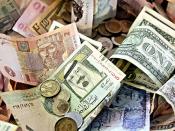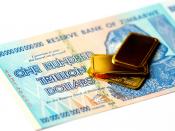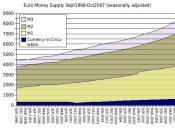If someone earns a sum of money, and saves it rather than spends it, then, in no way can a person be losing wealth if not for inflation, which prompts the prices of all goods and services to rise. One may see this as a trend among businesses to maximize their profits. In reality, the root cause of the problem is not with businesspeople, but the Federal Reserve System continuously adding more money into the economy. The article I have chosen to summarize examines the U.S. economy of today mainly the food and energy prices that have rose sharply since March 2003, which has prompted the Fed to concern itself with the onset of inflation.
In reality, what triggers the rise in prices is an increase of money in circulation, which is a result of the actions performed by the Federal Reserve. The Federal Reserve, being the government agency responsible for printing the nation money supply, determines how many dollar bills are put into circulation.
The dilemma arises because, when more money is added into the economy and an individual has not spent any of it, the person is now poorer in relation to everyone else than they once were. Adding more money into the economy dilutes the value of each individual dollar, thereby decreasing its purchasing power.
The article states that the price index gained larger than expected .3 percent, which adds to the inflation anxiety on Wall Street (Freilich). Inflation, however, tends to hurt the poor far more than it does the rich. For example, if a woman retires with four thousand dollars saved up, and the cost of a decent living is five thousand, then she only has eighty percent of what she needs to survive. Then, a year later, if there is one hundred percent...



None
I did enjoy it, it is very well written and easy to understand. Two thumbs up, good job.
3 out of 3 people found this comment useful.